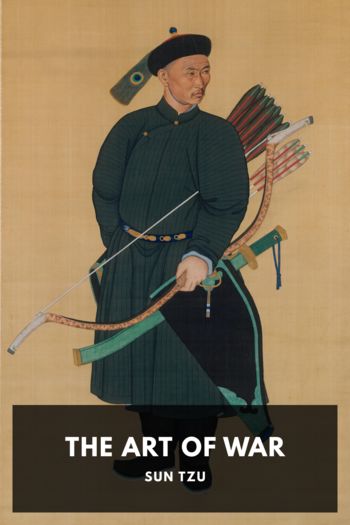Tao Te Ching, Laozi [the gingerbread man read aloud TXT] 📗

- Author: Laozi
Book online «Tao Te Ching, Laozi [the gingerbread man read aloud TXT] 📗». Author Laozi
象玄, “Representations of the Mystery.” In this chapter Lao approaches very near to give an answer to the questions as to what the Tao is, and yet leaves the reader disappointed. He commences by calling it “a thing (物);” but that term does not necessitate our regarding it as “material.” We have seen in the preceding chapter that it is used to signify “spirits and men.” Nor does his going on to speak of it as “chaotic (混成)” necessarily lead us to conceive it as made up of the “material elements of things;” we have the same term applied in ch. 14 to the three immaterial constituents there said to be blended in the idea of it.
“He does not know its name,” and he designates it by the term denoting a course of way (Tao, 道), and indicating the phenomenal attribute, the method in which all phenomena come before our observation, in their development or evolution. And to distinguish it from all other methods of evolution, he would call it “the Great Method,” and so he employs that combination as its name in ch. 18 and elsewhere; but it cannot be said that this name has fully maintained it self in the writings of his followers. But understood thus, he here says, as in ch. 1, that it is “the Mother of all things.” And yet, when he says that “it was before Heaven and Earth were produced,” he comes very near his affirmations in chapters 1 and 4, that “the nameless Tao was the beginning (or originating cause) of Heaven and Earth,” and “might seem to have been before God.” Was he groping after God if haply he might find Him? I think he was, and he gets so far as to conceive of Him as “the Uncaused Cause,” but comes short of the idea of His personality. The other subordinate causes which he mentions all get their force or power from the Tao, but after all the Tao is simply a spontaneity, evolving from itself, and not acting from a personal will, consciously in the direction of its own wisdom and love. “Who can by searching find out God? Who can find out the Almighty to perfection?”
The predicate of the Tao in the chapter, most perplexing to myself, is “It returns,” in par.3. “It flows away, far away, and comes back;”—are not the three statements together equal to “It is everywhere?” ↩
重德, “The Quality of Gravity.” Gravity and stillness are both attributes of the Tao; and he who cultivates it must not give way to lightness of mind, or hasty action.
The rule for a leader not to separate from his baggage waggons is simply the necessity of adhering ot gravity. I have adopted from Han Fei the reading of “the wise prince” for “the sage,” which is found in Ho-shang Kung; and later on the reading of “has lost his root” for his “loses his ministers,” though the latter is found also in Han Fei. ↩
巧用, “Dexterity in Using,” that is, in the application of the Tao. This is the substance of the chapter, celebrating the effective but invisible operation of the Tao, and the impartial exercise of it for the benefit of all men and all things.
I have given the most natural construction of the two characters at the end of par. 1, the only possible construction of them, so far as I can see, suitable to the context. The action of the Tao (non-acting and yet all-efficient) and that of the sage in accordance with it, are veiled by their nature of the sight of ordinary men.
It is more difficult the catch the scope and point of par. 2. If there were not the conditions described in it, it would be hard for even an intelligent onlooker to distinguish between the man who had the skill and the man without it, between his who possessed the Tao, and him who had it not, which would be strange indeed. ↩
反樸, “Returning to Simplicity.” The chapter sets forth humility and simplicity, and artless freedom from all purpose, as characteristic of the man of Tao, such as he was in the primeval time. “The sage” in par. 2 may be “the Son of Heaven,”—the head of all rule in the kingdom, or the feudal lord in a state. ↩
無爲, “Taking no Action.” All efforts made with a purpose are sure to fail. The nature of the Tao necessitates their doing so, and the uncertainty of things and events teaches the same lesson.
That the kingdom or throne is a “spirit-like vessel” has become a common enough saying among the Chinese. Julien has, “L’Empire est comme un vase divin;” but I always shrink from translating 神 by “divine.” Its English analogue is “spirit,” and the idea in the text is based on the immunity of spirit from all material law, and the uncertain issue of attempts to deal with it according to ordinary methods. Wu Chʽêng takes the phrase as equivalent to “superintended by spirits,” which is as inadmissible as Julien’s “divin.” The Tao forbids action with a personal purpose, and all such action is sure to fail in the greatest things as well as in the least. ↩
儉武, “A Caveat against War.” War is contrary to the spirit of the Tao, and, as being so, is productive of misery, and leads to early ruin. It is only permissible





Comments (0)